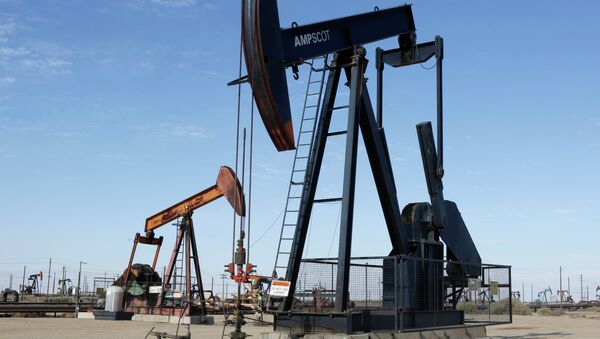Trump joining OPEC deal to violate the US law
"I don't think the new administration will join the OPEC & Non-OPEC deal. An oil production cap will help some of the shale oil producers in the United States but not all," Kamiar Mohaddes, a senior lecturer at the University of Cambridge’s Faculty of Economics, told Sputnik.
Although the six-month production cuts imposed on January 1 by OPEC members and 11 other producers including Russia would be helping major oil exporters to get higher revenues, oil prices would not grow over the mark of around $60 per barrel, which is the marginal cost for US shale oil producers, Mohaddes argued.
Moreover, the United States joining the oil curtailment deal would violate the US legislation passed to address oppressive business practices associated with cartels and oppressive monopolies, another expert noted.
"There is zero chance that the United States would join in an agreement to cut oil production. Such an agreement would be a violation of U.S. law, including the Sherman Antitrust Act and the Clayton Act," James Hamilton, a professor of Economics at University of California San Diego, said.
Trump's policy to encourage US firms to boost production
On the day of his inauguration, US President Donald Trump explicitly said the United States would be "committed to achieving energy independence from the OPEC cartel and any nations hostile" to the US interests, raising doubts the country would participate in the cartel’s efforts to stabilize the oil market and revive oil prices.
"President Trump's policy is likely to encourage more U.S. production by opening up federal properties. The one limiting factor on U.S. production will be whether firms can make a profit at current prices," Hamilton said.
"Many of these still have a hard time making a profit at $50 a barrel. The one area with the most promise of that appears to be the Permian in Texas," the US professor argued.
US government has little control over private market
While then President Barack Obama previously successfully lifted the ban on US exports of oil in late 2015, there’s little the federal government in Washington could do to encourage or limit the US oil production, Jim Krane, an expert in energy geopolitics, told Sputnik.
"The Trump administration has very little say in how much oil is produced in the United States. There are thousands of companies operating in the US oil sector, and most of the underground reserves of oil and gas are privately owned. Production decisions are made by private investors on the financial merits of the day," Krane, who works at Rice University's Baker Institute in Houston, explained.
As the United States has a wide range of interconnected regulations and market systems in place of the comprehensive long-term energy policy, Trump is currently focused on implementing "An America First Energy Plan," as titled by the White House, rather than joining the OPEC oil curtailment deal.




